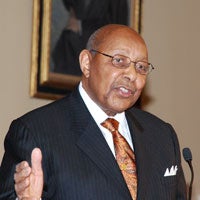Former U.S. Rep. Louis Stokes, who represented Ohio’s 21st district in Congress from 1969 to 1999, spoke at HLS on November 12, at the invitation of Harvard Law School’s Charles Hamilton Institute for Race and Justice.
Prior to his election to Congress in 1968, Stokes argued the petitioner’s appeal in the landmark “stop and frisk” case of Terry v. Ohio, which was decided by the Supreme Court earlier that year. In Terry, the Court ruled that the Fourth Amendment prohibition on unreasonable searches and seizures is not violated when a police officer stops a suspect on the street and searches him without probable cause to arrest—if the officer has a reasonable suspicion that the person has committed, is committing, or is about to commit a crime.
Introducing Stokes, Professor Charles Ogletree, Jr. noted his many accomplishments in the struggle for civil rights, including his 30 years in Congress, where he was the first African American to represent Ohio and one of the earliest members of the Congressional Black Caucus.
The youthful 83-year-old Stokes offered some wry advice to law students on arguing in front of the Supreme Court. “When you get there … try and watch the time,” he said.
“I had no idea when I argued Terry … that it would become a landmark case being taught in every law school in America, as well as every police department in our nation,” he recalled. “You have to remember, this is 1963. This is when the United States Supreme Court has just decided Miranda, Escobedo, the Mapp case, all those liberal decisions where police were required to tell people their rights before they could arrest them, where they had to exclude evidence not legally seized, not meeting the conditions of the Fourth Amendment.” Stokes recalled his satisfaction “that we could get that case all the way up and into the United States Supreme Court on the basis that this case law had never previously been decided by the Court.”
On the election of Barack Obama ’91 as president, Stokes said: “I’ve seen a lot of campaigns. I’ve seen a lot of candidates. Barack Obama ran the most beautiful, the most brilliant campaign I’ve ever seen run.” He referred back to President Kennedy’s attraction of the best minds of his generation to Washington and predicted, “I think you’re going to find now that Barack Obama will have available to him some of the brightest people in this country who will want to come to Washington and be a part of that administration.”
Describing the election’s significance for African Americans, Mr. Stokes said: “That night meant so much to me, it told me how far we have come, … how much we have been through to get there ….We’ve been a very patient people. And the patience has paid off.”
View the webcast of Louis Stokes’ speech.
– Lia Oppedisano
